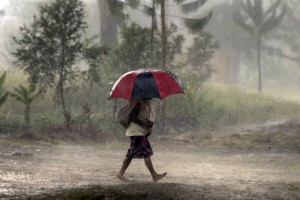No Going Back

Yesterday, some friends of mine had a daughter, who they named Abigail Rose. In the photos I saw this morning, she looks impossibly miniature, almost too tiny to be real; yet up close, she also sports a lot of thick brown hair and an oddly thoughtful expression.
I don’t have kids, so I’m sort of an outsider on the whole process, and I find it just a little bit mind-boggling. Looking at the photos, I can’t help but wonder: What will life be like for someone born in 2009? How will Abigail’s world be different from ours?
Sometimes I worry about that world. Take a new study released yesterday, which found that the effects of climate change are now irreversible–or, in the words of Science Daily, “To a large extent, there’s no going back.”
Led by the National Oceanic and Atmospheric Administration, the study found that even if all polluters stopped emitting carbon tomorrow, the effects of human-induced global warming could last for the next 1,000 years or more. That’s way beyond Abigail’s lifetime, her children’s, and even her great-great-grandchildren’s.
These shifts in Earth’s climate will also bring crisis on a human scale:
… Decreases in rainfall that last not just for a few decades but over centuries are expected to have a range of impacts that differ by region. Such regional impacts include decreasing human water supplies, increased fire frequency, ecosystem change and expanded deserts. Dry-season wheat and maize agriculture in regions of rain-fed farming, such as Africa, would also be affected.
Of course, effects like these don’t just belong to some dystopian future. For many people, especially in poor communities, they’re already a reality, and they will only get worse over time.
But if there’s no going back, maybe we’ll be forced to move forward.
In fact, even as I write this, a colleague emails me with the news: former Vice President Al Gore just this afternoon testified on climate change before the Senate Foreign Relations Committee. Among other actions, he called on US leaders to negotiate a “fair, balanced, and effective treaty” at the upcoming UN climate negotiations in Copenhagen, including measures to help developing countries to adapt to the crisis.
“We have arrived at a moment of decision,” said Gore. He said our efforts to deal with climate change “have been undermined by the idea that we must choose between our planet and our way of life; between our moral duty and our economic well being. These are false choices. In fact, the solutions to the climate crisis are the very same solutions that will address our economic and national security crises as well.”
So, let’s not waste any more time. After all, I’ve already seen the future–she may not have much to say yet, but she’s got a full head of hair, and a hell of a lot of potential.